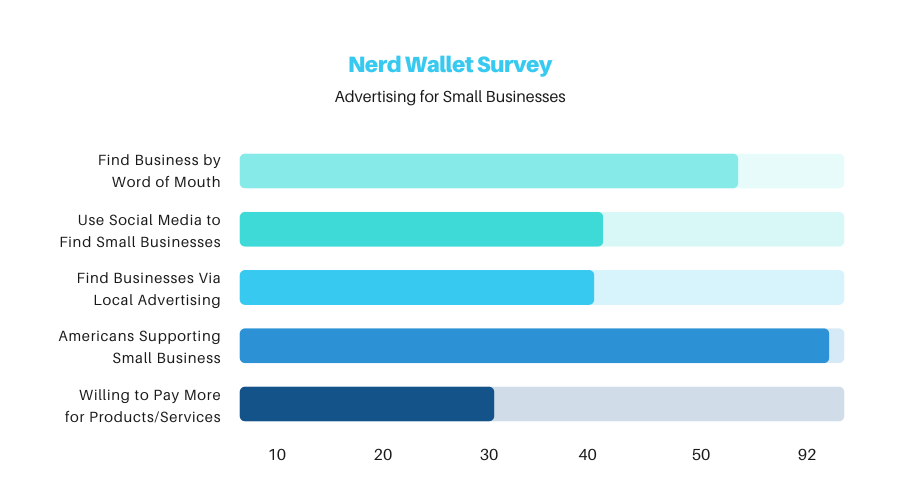Small businesses often do not have a large marketing budget. Some have no marketing budget, which is a major mistake. Even small neighborhood businesses should have a marketing plan so they can reach new people in the neighborhood or expand to other nearby neighborhoods. Many small businesses rely on word of mouth, which is great if you have a lot of happy customers. However, even so, word of mouth only reaches so far.
Creating a marketing strategy for your small business can help you reach new customers. It can also help you develop and maintain those relationships. While print ads, flyers and billboards are great ways to reach people, they are usually expensive methods. You might do well to plan for using those methods once your business picks up enough to support it – unless, of course, you can afford it now. In that case, those marketing vehicles should be part of your new strategy.
Define Your Small Business's Marketing Goals
Know what you want to accomplish with your marketing efforts before creating a marketing campaign, including how it can help with your business goals. Know what your unique selling proposition is – what makes your business stand out from your competitors, as you will need to highlight this in your marketing materials.
You can use your business plan to help define your goals and build better marketing strategies. Always track metrics, such as web visitors, customers gained, leads generated or revenue growth, when you define your marketing goals. The numbers will allow you to track and measure your results.
Additional metrics you may want to track include social media content engagement rates and conversion rates.
Define Your Target Audience
Once you know your marketing goals, define your target audience. This is the group of consumers who are more than likely to purchase your product or service. For example, you wouldn't try to sell dog treats to a person who prefers cats and would never have a dog in their house.
Common demographics that can describe your target audience might include age, race, income, ethnicity, education, gender, marital status and employment.
What is Organic Online Marketing for Small Businesses?
Online marketing is a major area of focus for many small businesses. A digital presence is a highly effective and low-cost way to reach customers. Your organic online marketing campaign might include:
A Business Website
The heart of your organic online marketing strategy should be a comprehensive website where customers can learn more about your business and the products and / or services you offer. If you are a retailer, you may want an e-commerce website to sell your products. A service provider might have a website showcasing their finished products. Your website should also have your business contact information and hours of operation.
Your website should also have informative information about your products and / or services. It will not rank on search engine results pages (SERPs) if the information is "spammy" or created through automation.
Business Blog
Having a website is not enough. A blog provides informative information about your products and services. The blog is the perfect place to show your experience, expertise, authoritativeness, and trustworthiness, which is exactly what search engines are looking for. Without this type of information, your site may never reach the top three SERPs.
While your blog should include mostly long-form content – that is, content that is over 1,000 words – it can contain a mixture of short-form and long-form content, especially if you are blogging about an event your business is hosting.
Optimize Your Website
Optimizing your website with keywords can improve visibility. Determining which keywords will help your website takes research. Most people hire content strategists to create content based on keyword research for their sites, especially if they build the websites themselves. This is a case of getting what you pay for. If you hire an inexpensive web developer, chances are, the developer is not going to know how to research keywords that could put your site on search engines' radars.
Use Website Analytic Tools
You can use Google Analytics and Google Search Console to monitor your website traffic. Several sites offer analytics packages for a price. Depending on what you are monitoring, Google's tools are often enough.
Create Social Media Profiles
A study of 3,000 adults by Nerdwallet found that:
- 92 percent of Americans say they support small businesses.
- 30 percent of Americans say they're willing to pay more for products and services purchased at small businesses rather than at a chain store or a major retailer.
- While 56 percent of customers find small businesses by word-of-mouth, 42 percent say they use social media to find small businesses. The survey also found that 41 percent find small businesses by local advertising, and 40 percent find them by driving or walking by the business.
Thus, it is important to create and curate social media profiles. Using platforms such as Facebook, Instagram, Pinterest, X, YouTube and LinkedIn can help increase your sales. You don't have to use all of the social media sites – choose what makes sense for your business.
Also, be sure to create a business profile on Google, Yelp, Bing and other search engines. When creating your social media profiles, be sure to use high-quality photos. Add videos about your business and create live chats.
Share special discounts for social media customers, and make sure you let your followers know about upcoming events. Always be sure you respond to direct messages and comments.
Ask your customers to post reviews on your social media pages, Google, and other review sites.
Finally, always make sure you give every potential and current customer that personal touch. They are not just a number or another customer. Cultivate a friendship with your customers – people love personal attention.
Email Marketing
Even with social media, email campaigns are important. If an email campaign is done well, it can be a cost-effective way of reaching potential customers. Your email marketing plan should be designed around the following factors:
- Frequency: Whether you send emails weekly, monthly or biweekly, be consistent.
- Type: This depends on the type of information you want to send. It might be in the form of a newsletter, product update, sale announcement, drip campaign, or abandoned cart reminder.
- Service Provider: Choose a reliable email service provider, such as HubSpot, MailChimp or another reliable service provider.
- Build an Email List: Use your current customer base, pull leads from your website and social media sites, and in-person sign-up sheets.
When creating an email campaign, be sure to use a subject line that is compelling but not spammy. You want your customers to open the email. Include links to your website and social media sites in the email. And always include at least one call to action.
Other Forms of Marketing
Some of the other forms of organic marketing include direct mail campaigns, fairs, trade shows, farmers' markets, print advertising in newspapers and magazines, broadcast advertising, an open house, sending out promotional merchandise, business cards and flyers.
You can also join local business communities to network and give out or hold incentives, such as giveaways, free trial products, flash sales and discounts.
Don't Discount Organic Marketing
While it takes longer for organic marketing, you can save a lot of money, even when you hire a content strategist to write your website content and blogs and do your keyword research. EpochWriter can help you with keyword research, writing content that meets Google's content guidelines, and creating social media posts for your business, whether retail or service-based.


















Comments